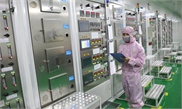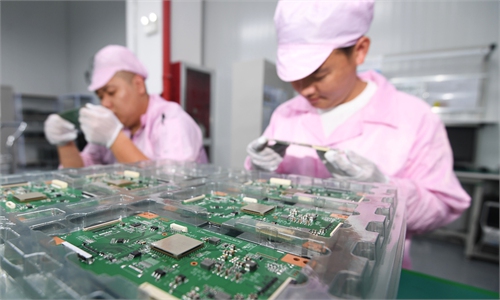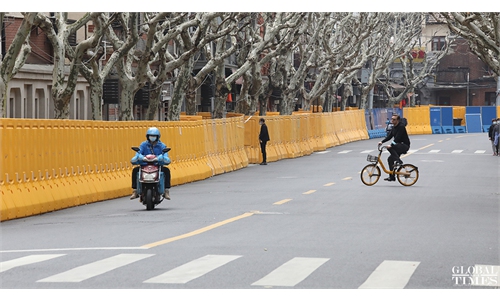US' attempt to form exclusive chips grouping will fail: says China's foreign ministry
S. Korean firms vow closer semiconductor ties with China
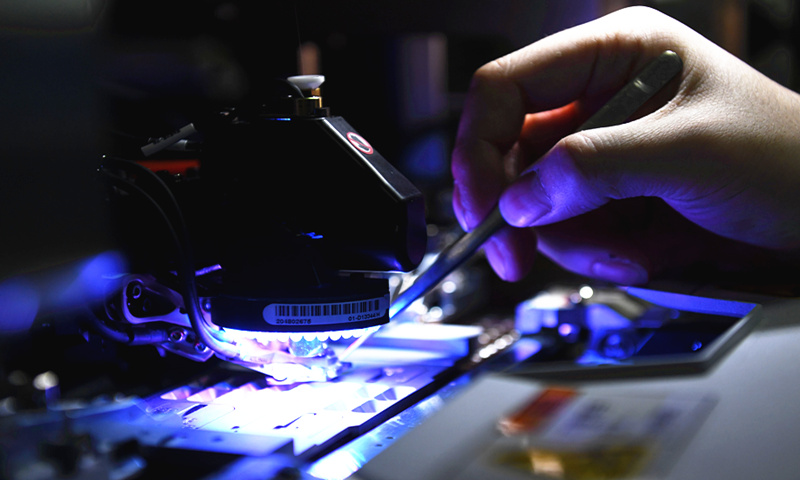
Workers make chips at Anhui Dongke Semiconductor Co in East China's Anhui Province on Saturday. The company is located in the Anhui Ma'anshan Economic and Technological Development Zone, and it is mainly engaged in the design, production and sales of green power chips. Photo: VCG
A move by the US to try to artificially promote industrial transfer and decoupling is against the trend, and also unpopular considering the deeper integration of the global economy, and such an attempt will inevitably fail, the spokesperson of China's Ministry of Foreign Affairs Zhao Lijian said on Tuesday.
Zhao was responding to the recent attempt by the Biden administration to undermine international trade rules and fragment the global market, especially the chip supply chain, by keeping China out of the game.
In curbing the Chinese mainland's important role in the global semiconductor supply chain, the US government has reportedly asked South Korea to reply to the US by the end of August on whether it will join the US-proposed "Chip 4" alliance that also include South Korea, Japan and China's Taiwan.
In responding to a media request for comment on the so-called "Chip 4" alliance, Zhao said that the semiconductors industry is highly globalized, and the division of labor and cooperation among countries has worked in promoting the continuous and rapid progress of chips technology.
The formation and development of the global chip industry supply chain is the result of the combined effect of market laws and corporate choices, Zhao noted.
While the US has always advertised the principle of "free trade," it has repeatedly abused its national power, and politicized and weaponized science and technology, while undermining international trade rules, the spokesperson said.
The comment came amid US Treasury Secretary Janet Yellen's trip to South Korea, with one focus of her visit being the need to develop stronger supply chains of key components, like chips and electric vehicle batteries, while attempting to squeeze China in these industries, some media reported.
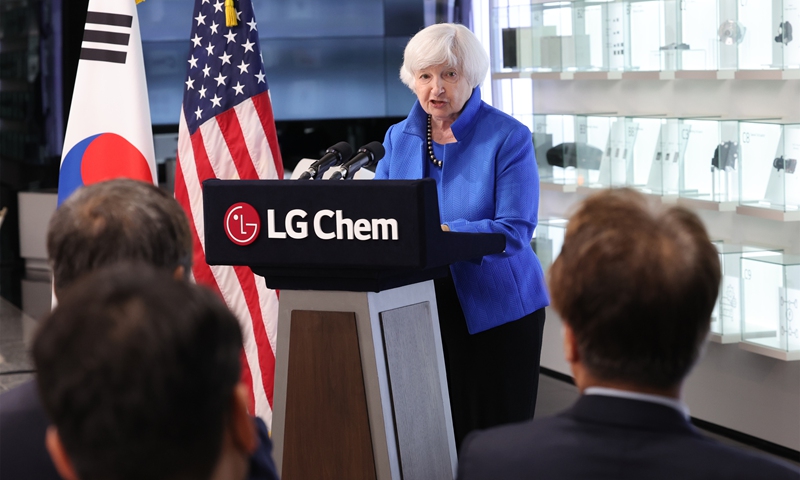
US Treasury Secretary Janet Yellen delivers a speech during a visit to LG Science Park, a research and development complex of the South Korean conglomerate, in Seoul, on July 19, 2022. Photo: VCG
The US' move is likely to have little outcome, since the semiconductor sector is a global business that needs a combined work force, and having the US "set its foot in the middle" would be the least thing that South Korean businesses want, given the possible disruption to the supply chain, insiders said.
A large South Korean electronics company told the Global Times on condition of anonymity on Tuesday that it has factories all over the world, and it doesn't see how its investment in the US could impact its business expansion in China, which plays an increasingly important role in the global supply chain.
Experts said that the Biden administration has been keen to develop its "small inner circle" in an attempt to dominate global chip supplies to pressure China.
"Yellen's visit to South Korea two months after Biden's visit serves an indication that the visit by Biden to the country has produced no substantive effect in a way it expected... but the attempt to push China out of the global supply chain is 'mission impossible'," Ma Jihua, a veteran technology analyst, told the Global Times on Tuesday.
In the past 10 years, South Korea has been fully integrated into China's industry chain, especially electronics manufacturing.
China-South Korea bilateral trade has been resilient in the first half of the year, exceeding the 1 trillion yuan ($148 billion) benchmark.
The Beijing office of the Korea International Trade Association (KITA) confirmed to the Global Times in a recent interview that semiconductors and finished batteries and materials for electric vehicles are among the sharply increasing goods that South Korea imports from China these days.
Originally, South Korea shipped semi-finished semiconductors to China, and after finishing the subsequent process of packaging in China, they were re-imported to South Korea, before being re-exported to third countries including the US, according to the association.
With rising demand for semiconductors after the pandemic, South Korea's imports of semiconductors from China have risen, KITA said, adding that the country's chip exports to China have grown for 24 consecutive months.
Securing the US' tough and dominant position in the semiconductors industry has been at the core of US President Joe Biden's policy agenda, with new measures including $52 billion in government subsidies and an investment tax credit to boost US manufacturing.
In response to the US' move to form an exclusive grouping on chips, Zhao said that it is hoped that relevant parties will uphold an objective and fair position, and do more things that are conducive to maintaining the stability of global chip supply.
